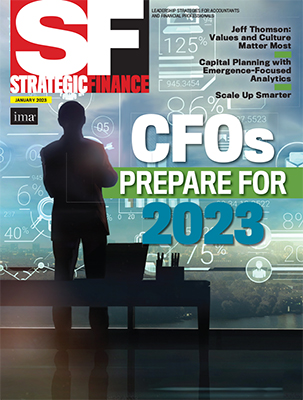After a lengthy and high-profile trial, Holmes was convicted in early 2022 on charges related to the collapse of her company, whose blood analysis technology was revealed to be largely fraudulent. In November 2022, Holmes was sentenced to more than 11 years in prison on four counts of defrauding investors, a cautionary tale on the perils of unethical behavior.
I’ve followed Holmes’s trial and subsequent sentencing closely, because about two years ago, during a panel at the IMA® Annual Conference & Expo, I interviewed Tyler Shultz, who played a key role in Theranos’s demise. Shultz, then just 22 years old, was the first whistleblower to expose the activities at the company and the underlying problem with its technology. During our interview, Shultz shared the enormous personal cost of being a whistleblower—the cost to his career, to be sure, but also the estrangement from his family, especially his illustrious grandfather, former U.S. Secretary of State George Shultz.
I was satisfied by the news of Holmes’s conviction and sentencing, as well as gratified for Shultz. He must have been enormously relieved (and he is, based on what I’ve read about his response) that his courageous action wasn’t in vain. Clearly, the U.S. courts agreed that it isn’t okay to raise money based on false scientific claims and to lie to investors with promises that can’t be kept. Fake it until you make it isn’t acceptable, and overselling is detrimental to society and our profession because it undermines trust.
Although Shultz was a scientist and not an accountant, his actions strike at the heart of what we believe as IMA members: A commitment to act ethically must undergird all we do as accounting and finance professionals, even when it requires great cost or sacrifice. As Shultz’s example demonstrates, being critical of an organization isn’t always easy, but it’s important to trust the process and hold onto your belief that the outcome will be worth it.
Fortunately, IMA provides many valuable resources to help us strengthen our ethics muscle. Of course, we have the IMA Statement of Ethical Professional Practice as well as our Ethics Helpline. IMA also makes available numerous educational courses on the subject of ethics, some of which provide suggestions for helping to prevent fraud. These preventative measures include things such as: (1) setting a strong tone at the top; (2) segregating duties; (3) using an external auditor; (4) providing board of directors’ oversight; (5) reviewing inventory, journal entries, and electronic transfers; (6) implementing a reconciliation process; and (7) setting up a fraud hotline. And remember that all IMA ethics courses are free for members.
Every new year offers an opportunity for a fresh start, a chance to look back on the past with discernment and consider ways to make improvements that will lead to a more promising tomorrow. I challenge us all to look for ways to renew our commitment to standing up for what’s right, even when it causes discomfort or personal hardship. The future of our organizations, and even society, might depend on it.

January 2023



